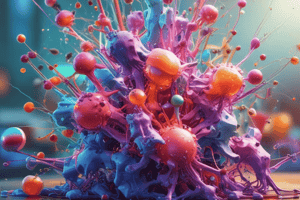Podcast
Questions and Answers
What is the main focus of chemical kinetics?
What is the main focus of chemical kinetics?
- Separating mixtures using chromatography
- Determining mechanisms through which molecules transform into products (correct)
- Studying carbon-based compounds
- Examining spatial arrangement of atoms
What does the order of a reaction represent?
What does the order of a reaction represent?
- An integer assigned to each reactant or product based on its effect on reaction rate (correct)
- The methodology used to connect molecular bonds
- The specific reactivities within the compound
- The time required for half of a substance to react
Which technique is used for separating mixtures containing different organic molecules based on their partition coefficients?
Which technique is used for separating mixtures containing different organic molecules based on their partition coefficients?
- Chromatography (correct)
- Stereochemistry study
- Collision theory
- Bond formation and cleavage
What do catalysts do in a chemical reaction?
What do catalysts do in a chemical reaction?
What is the key aspect of organic chemistry that deals with recognizable atom arrangements responsible for specific chemical properties?
What is the key aspect of organic chemistry that deals with recognizable atom arrangements responsible for specific chemical properties?
Which discipline of chemistry primarily deals with carbon-based compounds and employs covalent bonds?
Which discipline of chemistry primarily deals with carbon-based compounds and employs covalent bonds?
What is the main focus of electrochemistry?
What is the main focus of electrochemistry?
Which device directly converts chemicals into electrical energy through oxidation-reduction reactions?
Which device directly converts chemicals into electrical energy through oxidation-reduction reactions?
What type of process leads to metals deteriorating due to their interaction with water or other chemicals?
What type of process leads to metals deteriorating due to their interaction with water or other chemicals?
Which subdiscipline of chemistry focuses on how matter behaves and interacts under diverse conditions?
Which subdiscipline of chemistry focuses on how matter behaves and interacts under diverse conditions?
What are galvanic cells also known as?
What are galvanic cells also known as?
Which process involves the transfer of electrons between species?
Which process involves the transfer of electrons between species?
Flashcards are hidden until you start studying
Study Notes
Exploring Chemical Worlds: Electrochemistry, Kinetics, Organic Chemistry
Our journey through the vast landscape of chemistry will lead us to three fascinating subdisciplines: electrochemistry, chemical kinetics, and organic chemistry. Each offers unique insights into how matter behaves and interacts at various scales and under diverse conditions. Let's delve deeper into these areas, examining their foundational principles while highlighting their practical applications.
Electrochemistry: Harnessing Electricity from Chemical Reactions
Electrochemistry is all about understanding the relationship between electricity and chemical reactions. It frequently involves using an external power source like batteries or fuel cells, which can influence reaction rates and selectivity by applying electric potential differences across reactants. This field allows chemists to create new materials or generate energy through processes such as corrosion prevention, battery development, and catalysis.
Here are some essential concepts within this realm:
- Redox reactions: These occur when electrons are transferred between species.
- Galvanic cells: Also known as voltaic cells, they use spontaneous redox reactions to produce electrical current.
- Fuel cells: Devices that convert chemicals directly into electrical energy via controlled oxidation–reduction reactions.
- Corrosion: A type of electrochemical process where metals deteriorate due to their interaction with water or other chemicals.
Chemical Kinetics: Understanding Rate Laws and Mechanisms
Chemical kinetics focuses on elucidating the factors influencing reaction rate and determining mechanisms through which molecules transform into products. By studying kinetics, we can predict reaction outcomes, optimize synthetic routes, and design efficient industrial processes. Central ideas include:
- Collision theory: Describes the relationship between reaction rate, concentration, temperature, activation energy, and collision frequency of reactant particles.
- Order of a reaction: An integer assigned to each reactant or product based upon its effect on the overall reaction rate.
- Half-life: The time required for half of a substance to react in a first-order reaction.
- Catalysts: Substances that lower activation energies without being consumed during reactions, thus increasing reaction rates without altering equilibrium.
Organic Chemistry: Synthesizing Carbon-Based Molecules
Organic chemistry is often referred to as the core discipline of modern chemistry—it deals primarily with carbon-based compounds. Unlike inorganic chemistry, it employs covalent bonds to synthesize an extensive array of organic molecules, including pharmaceuticals, polymers, and fuels.
Some key aspects of organic chemistry:
- Functional groups: Recognizable atom arrangements responsible for specific chemical properties and reactivities within the compound.
- Bond formation and cleavage: Methodologies used to connect or break molecular bonds.
- Stereochemistry: Study of spatial arrangement of atoms, the consequences of stereoisomers, and chirality.
- Chromatography: Technique for separating mixtures containing different organic molecules according to their partition coefficients.
As you navigate your journey through these disciplines, I encourage you to reflect upon the remarkable depth and breadth of our field. While we have highlighted only a few facets here, much awaits discovery and innovation! Remember, the true strength of chemistry lies in its ability to illuminate and tackle challenges spanning many fields—from biology and physics to engineering, materials science, and environmental sciences. So, let's keep exploring together!.
Studying That Suits You
Use AI to generate personalized quizzes and flashcards to suit your learning preferences.




